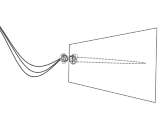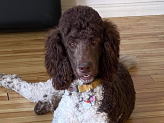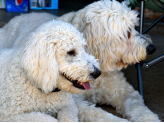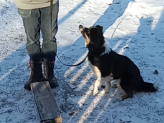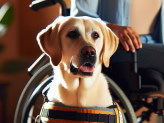- Homesteading
- Service Dog DIY
Disabled Woman Needs Service Dog
Why Not DIY?
With a little help there's no reason why you can't train your own service dog. The advantages are many - not least of which is the cost.
I need some specific traits in my service dog, so I deliberately looked for a puppy who would have some stature as an adult.
My choice of breeds is not one that others would find a good selection, but Mastiff x Rottweiler x Bouvier des Flandres is what I've gone with. Each of these breeds on their own is trainable, and used for protection, support and farm work. So my thinking is that this type of mix will be reliable and calm (eventually).
So it begins. I've found some good resources, including one forum and website which teaches clicker or marker training, and a Facebook group and affiliated website solely dedicated to training a personal service dog.
Depending on what kind of assistance you need, your ideal service dog can be almost any size. For a diabetic alert dog, even a small dog will be perfectly capable of helping you avoid high blood sugar, and even be able to bring your medications.
Larger breeds are most used for bracing and balance support, as well as retrieving, guiding and protection.
Some breeders of purebred dogs are concentrating their efforts on producing puppies with the skills necessary to become a good service dog, but there are plenty of mixed breeds and even rescue dogs that have exactly the right traits.
A puppy in the case of a rescue dog might not develop into the support you need, but a younger adult dog might be exactly right.
Look for a dog or puppy that is calm, that's one of the most important traits, and one of the hardest skills for them to learn.
Keep in mind that most service dogs need two years to mature from puppy age, and it takes at least that long to train all the skills they'll need. After that, they could live for ten or more years, but some of that will be in retirement.
My journey has just begun with Sable, my potential assistance dog. She's an Italian Mastiff x Rottweiler x Bouvier mix - all well known as working breeds, so she should have the right work ethic. Only time will tell.
There are many ways to train dogs, but the method I've chosen is to use positive reinforcement rather than forceful methods such as prong collars, choke chains or e-collars.
This is a new world for me. I've been doing a lot of playing with Sable, giving her lots of exercise with a flirt pole, and teaching her to walk politely.












